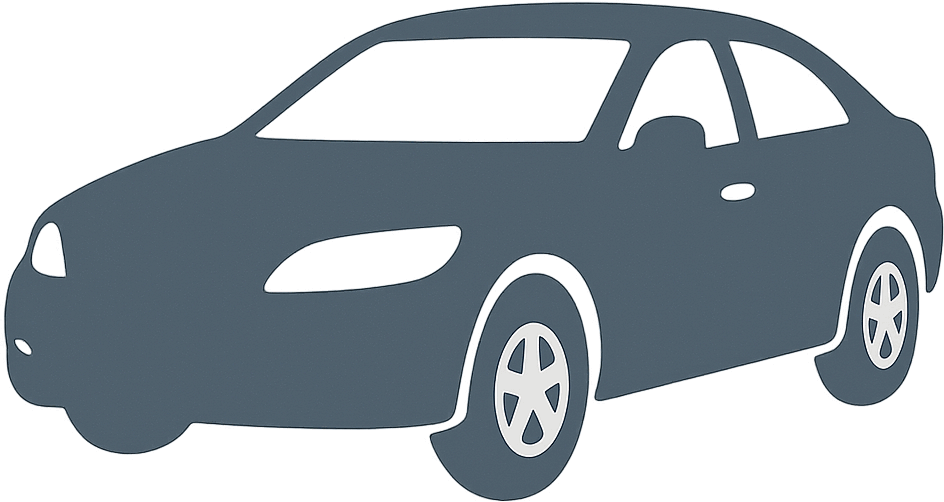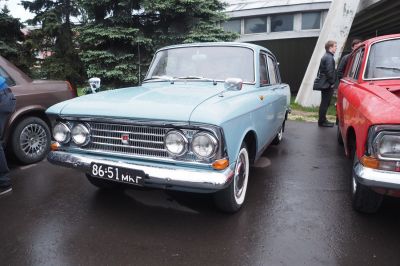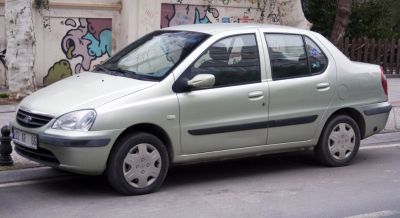 1969 Moskvich 408 IE Dimensions, Size & Specs
1969 Moskvich 408 IE Dimensions, Size & Specs
Measurements of the 1969 Moskvich 408 IE, engineered for optimal performance and comfort
| Dimensions | |
|---|---|
| Length: | 4090 mm161.0 in13.4 ft |
| Width: | 1550 mm61.0 in5.1 ft |
| Height: | 1480 mm58.3 in4.9 ft |
| Weight Specifications | |
| Curb Weight: | 990 kg2183 lbs |
| Maximal permitted Weight: | 1330 kg2932 lbs |
The Moskvich 408 IE, produced from 1969 to 1975, is a compact sedan representing Soviet automotive design of the late 1960s and early 1970s. Measuring 4090 mm (161.0 inches) in length, 1550 mm (61.0 inches) in width, and 1480 mm (58.3 inches) in height, this vehicle offers a practical and modest footprint suited for urban and suburban environments. With a curb weight of 990 kg (2183 lbs) and a maximum weight capacity of 1330 kg (2932 lbs), the 408 IE strikes a balance between lightweight construction and adequate load capacity typical of its era. The sedan's dimensions allow for comfortable seating for four to five passengers, while its relatively narrow width and moderate height contribute to maneuverability on narrower Eastern European roads. This generation of the Moskvich 408 continued the brand's emphasis on reliability, simplicity, and affordability at a time when Western automotive designs were more complex and larger. The 408 IE stands as an important model within the Moskvich lineup, reflecting the evolving needs of drivers in the Soviet Union between 1969 and 1975. Its size also aids in comparing it against other compact sedans of its time, providing an insightful reference point for enthusiasts and researchers interested in automotive history and size evolution.
Discover the standout features that make the 1969 Moskvich 408 IE a leader in its class
Have a question? Please check our knowledgebase first.
The Moskvich 408 IE sedan from 1969 to 1975 measures 4090 millimeters (161.0 inches) in length, 1550 millimeters (61.0 inches) in width, and 1480 millimeters (58.3 inches) in height. These dimensions make the car compact compared to many modern vehicles, emphasizing its design practicality suitable for its era. Its compact footprint helps with urban driving and parking, reflecting the typical styling and functional sizing of late 1960s to early 1970s sedans.
The curb weight of the Moskvich 408 IE is approximately 990 kilograms (2183 pounds), which refers to the weight of the vehicle with standard equipment, all necessary operating consumables like motor oil and coolant, and a full fuel tank, but without passengers or cargo. The maximum permissible weight, also known as the gross vehicle weight, is 1330 kilograms (2932 pounds). This weight includes the maximum load capacity, combining passengers, cargo, and the curb weight. These weight figures reflect the vehicle's balance between build quality and performance for its compact size.
The Moskvich 408 IE has a width of 1550 millimeters (61.0 inches), which is just over 1.5 meters wide. Standard garage widths typically range from 2400 to 3000 millimeters (about 94.5 to 118 inches). Given its compact width, the Moskvich 408 IE comfortably fits into a standard garage with ample clearance on either side. The car’s relatively narrow profile makes it easier to maneuver in tight spaces typical of many residential garages, ensuring convenient storage and minimizing the risk of damage when parking indoors.
With a height of 1480 millimeters (58.3 inches), the Moskvich 408 IE offers a moderate vertical space inside the cabin, typical of sedans from its production era. While not particularly tall, the height allows for reasonable headroom and comfortable seating posture for average-sized adults. The interior design prioritizes a balance between aerodynamics and passenger comfort, with sufficient roofline clearance. The headroom and cabin space ensure practicality for daily commuting and family use, though taller passengers may find the vertical space somewhat limiting compared to modern sedans.
The Moskvich 408 IE is essentially an evolution of the Moskvich 407, featuring a similar but slightly updated design. The 408's length of 4090 millimeters (161.0 inches) and width of 1550 millimeters (61.0 inches) are comparable to or slightly larger than the 407's dimensions, representing modest growth in size to enhance passenger comfort and trunk space. The design improvements of the 408 included better styling and refinement, while maintaining compactness. Overall, the 408 offered a more modern look and practical improvements without significant departures in external dimensions from the reliable 407 base.
Dimensionally, the Moskvich 408 IE aligned with many compact sedans of its time, such as the Ford Cortina Mark II or the VAZ-2101. At 4090 mm (161.0 inches) in length and 1550 mm (61.0 inches) in width, it was smaller than many Western models but competitive within Eastern European car markets, focusing on economical size and practicality. The 408's curb weight of 990 kg (2183 lbs) was also on the lighter side, aiding fuel efficiency. In essence, the 408 fit well within the typical compact sedan category, emphasizing modest dimensions for urban usability and affordability.
Yes, with a length of 4090 mm (161.0 inches) and width of 1550 mm (61.0 inches), the Moskvich 408 IE is well-suited for typical parking spaces that in many cities are designed to accommodate vehicles around 4500 to 5000 mm (177 to 197 inches) long and 1800 to 2200 mm (71 to 87 inches) wide. Its compact size allows easier parking in urban areas and tight spaces where larger vehicles might struggle. This compactness was a key advantage for drivers in city settings and narrow streets often found in Soviet and European urban areas when the car was produced.
The Moskvich 408 IE, produced between 1969 and 1975, is a compact four-door sedan designed with practicality and durability in mind. Known for its reliability, the 408 IE featured a four-cylinder overhead valve engine and simple mechanicals that were easy to service. It offered basic comfort with a modest interior layout typical of Soviet cars of the time. The emphasis was on affordability and robustness suited for varied road conditions. Despite its modest size and features, the 408 IE was a popular family car and taxi choice in the USSR and neighboring countries.
With a curb weight of 990 kilograms (2183 pounds), the Moskvich 408 IE benefits from relatively light mass for a sedan, which positively influences its fuel efficiency and handling. The vehicle's weight allows for adequate acceleration and manageable performance while maintaining fuel economy, especially important during the economically focused automotive industry of the Soviet era. The relatively low weight also contributes to nimble driving characteristics, enabling better maneuverability on difficult or less maintained roads. Overall, the weight balance supports the car’s role as an economical and practical transportation solution.
The Moskvich 408 IE was designed to comfortably seat four to five passengers within its compact sedan body. The cabin dimensions, influenced by its exterior height of 1480 mm (58.3 inches) and width of 1550 mm (61.0 inches), provide adequate legroom and headroom for average-sized adults, although the rear seat might be slightly cozy for three adults during longer trips. Interior design was utilitarian, focusing on functionality rather than luxury, featuring straightforward controls and basic trim. Overall, the interior offers practical space for families or small groups, suitable for daily commuting and moderate travel.
Discover similar sized cars.

| Production: | 1964-1969 |
|---|---|
| Model Year: | 1964 |
| Length: | 4090 mm161.0 in |
| Width: | 1550 mm61.0 in |
| Height: | 1480 mm58.3 in |

| Production: | 2002-2009 |
|---|---|
| Model Year: | 2002 |
| Length: | 4150 mm163.4 in |
| Width: | 1620 mm63.8 in |
| Height: | 1540 mm60.6 in |

| Production: | 2020-present |
|---|---|
| Model Year: | 2020 |
| Length: | 4170 mm164.2 in |
| Width: | 1620 mm63.8 in |
| Height: | 1525 mm60.0 in |
